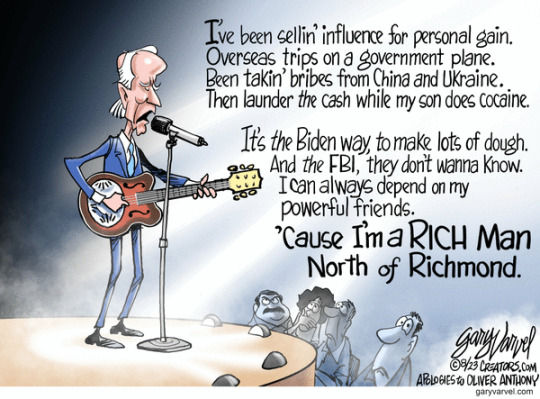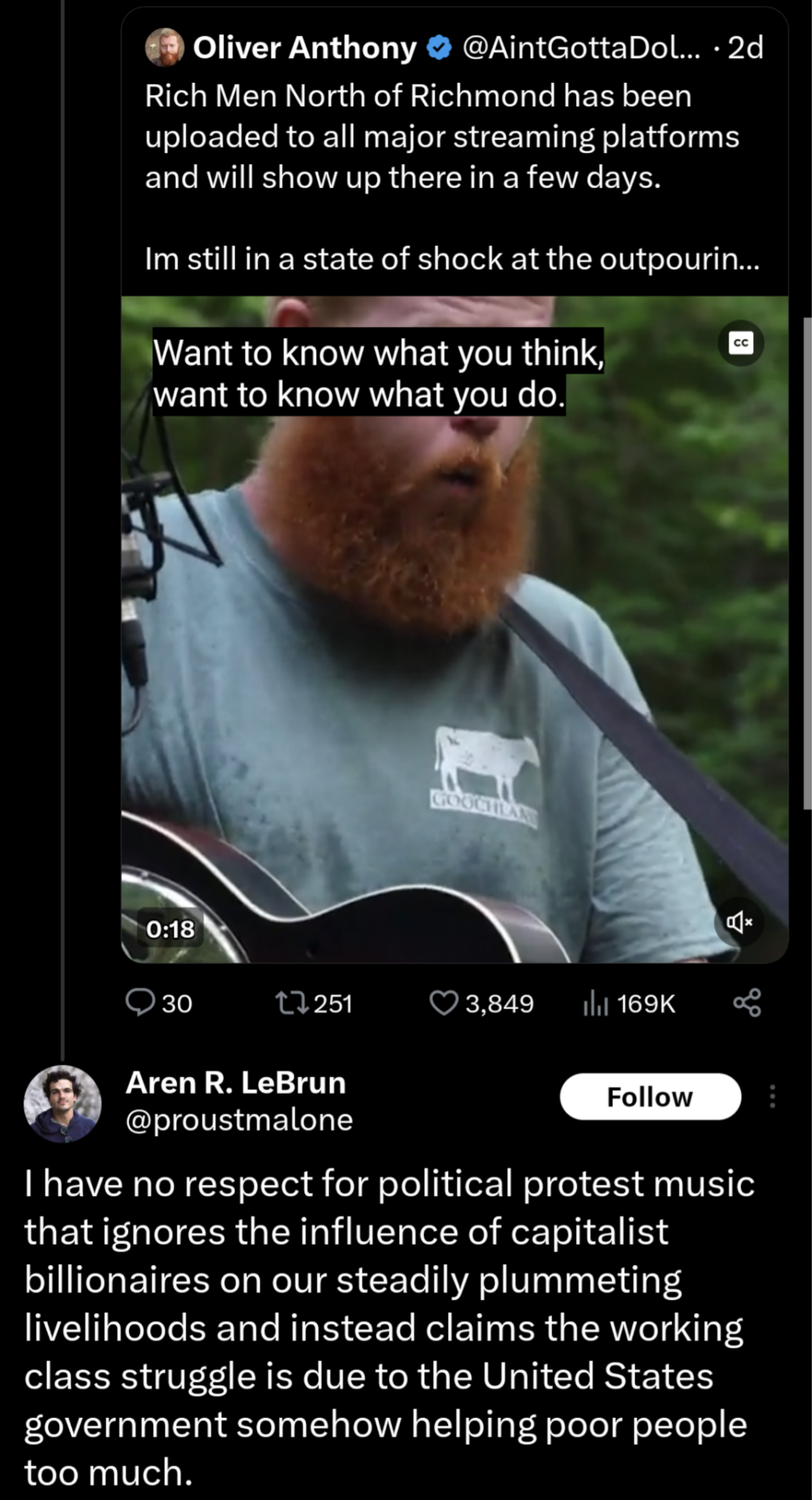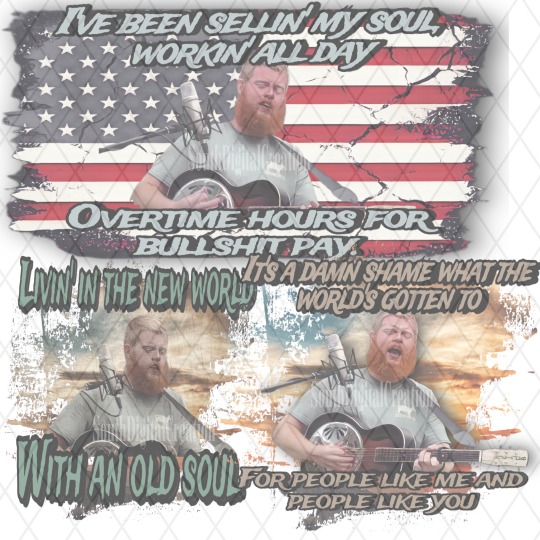#Oliver anthony
Explore tagged Tumblr posts
Text
This is amazing.
link
463 notes
·
View notes
Text
Oliver Anthony - What I saw in Western North Carolina
54 notes
·
View notes
Text

170 notes
·
View notes
Text
I listened to that rich men from richmond song and at the start I was very confused why some people were angry at it and then the welfare stuff started and yikes.
Imagine making an anti government song that explicitly attacks millionaires and then derailing into hating poor people in the middle of it.
197 notes
·
View notes
Text


I feel like calling him a king would be insulting to him.
He's a good man for this.
118 notes
·
View notes
Text
youtube
Oliver Anthony Music - Cowboys and Sunsets
23 notes
·
View notes
Text

X
#Twitter#X#Oliver anthony#Rich men north of richmond#Shock#Aren r lebrun#Political#United states#Government
62 notes
·
View notes
Text
At first glimpse, the video clip looked like my kind of music: a young bearded guy up in the woods of Appalachia, playing a resonator guitar. As soon as he started singing, I was on board. “I’ve been sellin’ my soul, workin’ all day, overtime hours for bullshit pay.” Preach, brother! When Anthony sang of “rich men north of Richmond, they want to have total control�� I had in my mind corporate America, the tech bro billionaires whose companies monitor their workers all the way to the bathroom and back. I was still with him when he highlighted “folks on the street with nothing to eat” but was brought up sharp when he followed it with “and the obese milkin’ welfare”. Whoa! What is he saying here? Homeless hungry people need help, but not if they’re overweight? When the next line attacked short, fat people who receive welfare only to spend it on chocolate biscuits, I figured the song was a parody. Why didn’t he rhyme “tax” with “snacks”, the songwriter in me thought. But it isn’t a parody. Anthony really does punch down on the poor. The lives of ordinary working people are being torn apart by the rich, he laments, but we can fix it if we cut welfare – and taxes too. Listening to the lyrics in that context, I came to understand why the song had gone viral among rightwing figures in the US. It’s a classic example of the divisive narrative that bosses have used to pit worker against worker since the days of Joe Hill. If the poor are fighting one another over racial hierarchy or cultural grievance, their anger will be directed away from the people responsible for their plight – the rich who exploit those in work and abandon those in need.
58 notes
·
View notes
Text

#digital art#digital aritst#digital arwork#sublimation#etsyfinds#girl art#etsysmallbusiness#etsysmallshop#artists on etsy#digital download#oliver anthony#rich men north of richmond#country girls#country men#country music playlist 2023#country#country songs#country music#country club#country bread#country boy#country soul#country chic#country blues#country home#country house#country bumpkin#country folk#country diary#country guys
21 notes
·
View notes
Text
We need to find the portal these random ass male country singers are popping out of and close it forever 😭
20 notes
·
View notes
Text
Oliver Anthony - I Want To Go Home
youtube
19 notes
·
View notes
Text
The same people gushing over Green Day changing their lyrics to American Idiot to fit modern politics are the same people who had a meltdown over some guy in Virginia.
7 notes
·
View notes
Text

13 notes
·
View notes
Text
David Browne at Rolling Stone:
OVER THE LAST few years, the Gulf Coast Jam, a multi-day concert blowout held every spring in Panama City Beach, Florida, has become one of country music’s leading festivals, pulling in headliners like Miranda Lambert, Luke Bryan, Florida Georgia Line, Kane Brown, and Kenny Chesney. But recently, festival producer Rendy Lovelady has noticed something unusual backstage. “Ten or 15 years ago, everybody would sit in a circle around the table, pull out their guitars and start singing old country songs,” he says. “There was a lot of camaraderie. Whereas now, the camaraderie has definitely lessened. They tend to stay in their own community.” Part of Lovelady wonders if it’s the lingering after-effects of Covid-19, which forced touring performers to interact as little as possible with anyone outside their circle. But it’s also possible that the drop-off in backstage hangtime is a sign of something else: the national culture wars seeping into the traditionally close-knit country community, a space where artists often take pains to refer to their peers as “my good buddy” or compliment one another.
From less personal interaction backstage to public online feuds, country music is slowly being pulled into the same battles that have infiltrated nearly every aspect of American life and entertainment. “It really is weird right now,” says one leading country manager, who spoke on the condition of anonymity given the sensitivity of the moment. “Country music has aways been this kind of neighborhood where everyone gets along. We had everyone’s back. But it doesn’t feel that way anymore. The heels are dug in more than ever. It’s pretty heavy.” The manager has also witnessed the same backstage chilliness that Lovelady recounts. However, he says it is unquestioningly due to opposing political ideologies and beliefs. “I’ve always enjoyed seeing people in the hallways backstage,” he says. “But it’s not like that. You tend to avoid people, because everyone talks politics backstage. Everyone used to leave their dressing room doors open. The doors are shut now.”
The major signs that Nashville is visibly fracturing have all happened fairly recently. In August of last year, country and alt-pop singer Cassadee Pope, and then Maren Morris, took Jason Aldean’s wife Brittany to task for making seemingly transphobic comments. (“I’d really like to thank my parents for not changing my gender when I went through my tomboy phase,” Brittany Aldean posted.) This summer, her husband’s song “Try That in a Small Town,” and especially its controversial music video, led to Americana songwriter Jason Isbell tweeting, “Dare Aldean to write his next single himself. That’s what we try in my small town.” On X (the social media site formerly known as Twitter), Jake Owen, a mainstream country singer, seemed to side with Aldean. He clapped back at Isbell by writing in part, “Jason, you’re always the first to get behind your keyboard and spout off with this stupid shit.” (He since posted that he “came in hot on the conversation because I’m passionate about” songwriters.) The public tiffs also included Zach Bryan, whose duet with Kacey Musgraves “I Remember Everything” is on track to be the Number One song in the nation, taking a shot in April at country acts “insulting transgender people.” The comment was prompted by veteran Travis Tritt’s tweet that he would be “deleting all Anheuser-Busch products from my tour hospitality rider” following a Bud Light promotion that featured transgender influencer Dylan Mulvaney. Bryan, who said that he wasn’t aiming directly at Tritt, later talked it out in person with the Nineties star at a music festival in Texas, with Bryan calling Tritt “a good guy” and Tritt saying, “So glad we had a chance to chat, Zach.”
Although these feuds haven’t dominated the genre, they also haven’t gone unnoticed. “Like all industries, we’re not immune from the external pressures and the world at large,” says R.J. Romeo, president of the Romeo Entertainment Group, a leading talent agency that books country acts. “So naturally, there’s more divisiveness in the country now than ever before. That’s going to show up in opinions on music and everything.” The history of country music hasn’t been without its share of fights and rumbles; ask anyone who’s worked on an awards show or at a festival and you’ll hear tales of artists grumbling about their peers’ egos, sales figures, or place on the bill. In 2013, Zac Brown made waves when he called Luke Bryan’s song “That’s My Kind of Night” the “worst song I’ve ever heard.” They later hammed it up and hugged it out on live TV at the CMA Awards.
Public quarrels over politics, meanwhile, have been as rare as synthesizer solos in the genre. The then-Dixie Chicks’ feud with Toby Keith, which started when Chicks singer Natalie Maines criticized one of Keith’s songs in a 2002 interview and caught fire after Maines dissed George W. Bush onstage in the U.K. over the 2003 Iraq invasion, was one of the few times in recent memory when open warfare broke out among country artists over political matters. Such quarrels may become more common. “With everything heating up with the presidential race, people are beginning to have very distinct opinions,” Lovelady says. And the shift, involving country stars of different generations and accelerated by social media, has been jarring for longtime observers. Country acts, Romeo says, “all go through media training, and they’re usually very diplomatic or middle of the road with a lot of their responses. But I’ve seen more artists come out of what we call ‘the artist bubble’ and show more of their true self, you could say — or their less polished self.”
Rolling Stone explores how the culture wars are roiling the once-tightknit community of country music fans.
#Culture Wars#Country Music#Music#Politics#Maren Morris#Jason Aldean#Morgan Wallen#Oliver Anthony#Zach Bryan#Travis Tritt#The Chicks#Toby Keith#Jake Owen
12 notes
·
View notes
